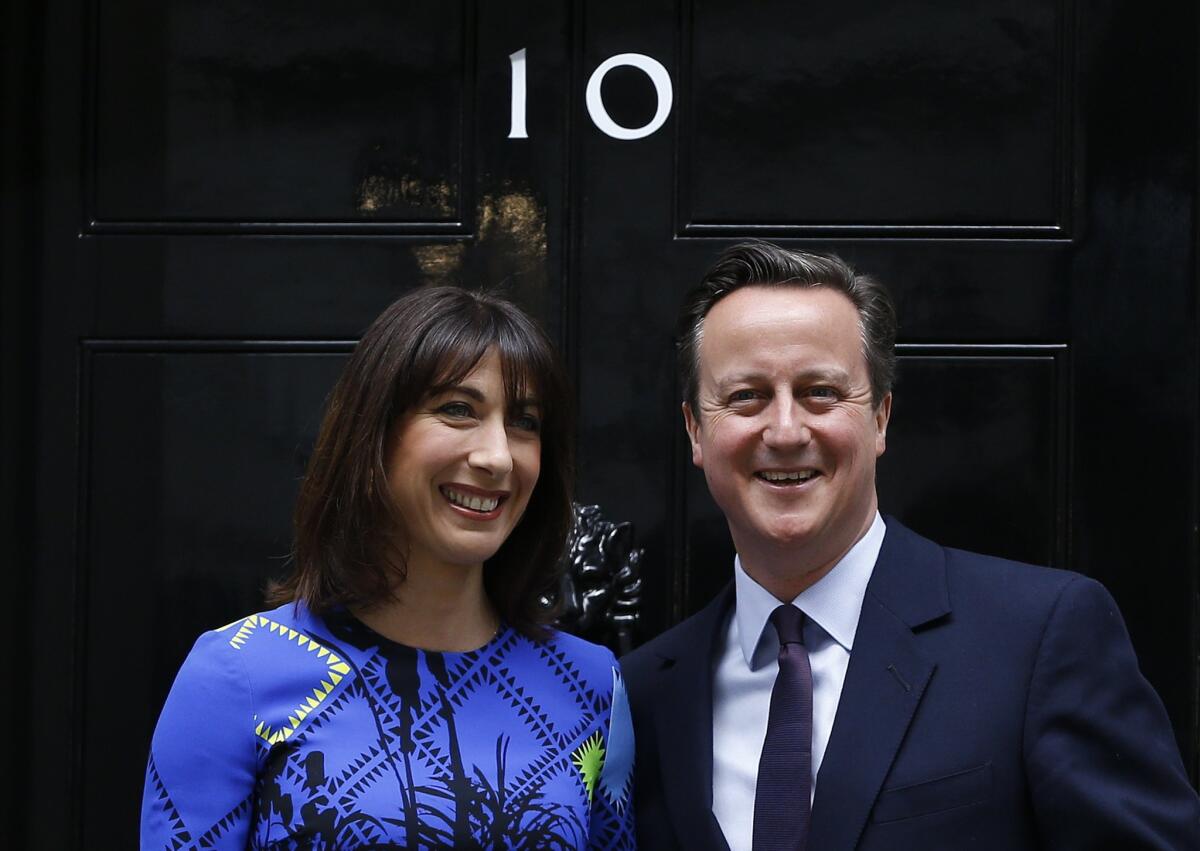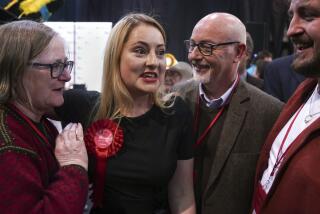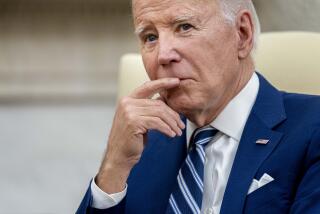David Cameron’s startling victory: 6 lessons to be drawn

Prime Minister David Cameron and his wife, Samantha, smile from the steps of 10 Downing Street in London after meeting with Britain’s Queen Elizabeth II in a traditional formality, where he informed her that he has enough support to form a government.
The British election results Thursday night took even the seasoned by surprise. A race that was supposed to be tighter than a bearskin hatband and even set off a parliamentary crisis turned out to be a romp for David Cameron’s Conservatives, who defeated Ed Miliband’s Labor by 331 to 232 seats.
The events had implications for the United Kingdom’s two major parties as well as many others across the spectrum. We break down the lessons from a seismic day in British politics.
Laboring. It’s a phenomenon that shares elements with the shattering losses of Democrats in several U.S. midterm elections: A party that once bore the working-class mantle is decimated by a conservative party, especially in blue-collar areas. Labor’s demise in Scotland (to the nationalist-left Scottish National Party) and Northern England (to the Conservatives) was thorough, and will occasion hand-wringing for whoever takes over the party. (Ed Miliband, who resigned Friday, tweeted that “the responsibility for the result is mine alone.”) Of course, politics loves a comeback. Miliband’s brother David, outmaneuvered for the head of Labor in 2010 and currently in New York as the head of a humanitarian group, could well return to the U.K. to fanfare and expectation, tasked with reversing a Democrat-esque collapse. And speaking of blue and red state divides ...
What’s the matter with (or in) Scotland? A burgeoning post-referendum movement for homegrown representation turned into full-blown political revolt Thursday as the Scottish National Party took 56 out of 59 seats it was running for. The Scots have been throatily endorsing the SNP, which also runs the country’s own (modestly mandated) Parliament and is led by Nicola Sturgeon, a straight-talking figure who is one of the fastest-rising stars in British politics (if also, for the right, one of its most polarizing). There’s a sense among many analysts that these are the first stirrings of another Scottish independence referendum and even eventual separation from the United Kingdom. The fact that the SNP will now be in the opposition instead of a Labor-led governing coalition should only boost those efforts -- members can snipe at and thwart Cameron’s agenda from the sidelines, delighting constituents, without being faulted for the government’s futility or unfavorable actions.
What’s the matter with polling? This is supposed to be the era of Big Data. So how did all the polls -- from the BBC to the Guardian/ICM -- get it wrong? The surveys all predicted neck-and-neck races; indeed, the margin between Conservative and Labor was never more than 2% in nearly all the major polls dating back months.
One simple answer is the sampling methods. Pre-election polls tend to look at national sentiments, discounting the local and granular forces that make up a Parliamentary election. (After all, the 650-member House of Commons is pieced together via hundreds of local elections.) Or it’s possible that many voters who planned to vote Labor got to the booth and decided to stick with the Conservative status quo. Still, it will prompt some pollster soul-searching--as it already has for one of the masters of data himself.
The Lib Dem-ise. It was just five years ago when Cleggmania gripped Britain and the centrist-minded Liberal Democrats rode a strong election to 57 seats and a spot with the Conservatives in the governing coalition. But that time may as well have been the Tudor era on Thursday night--the party captured just eight seats, effectively sidelining it from the political scene, at least for now, and reversing Nick Clegg’s rocket ride, at least for now. (He narrowly won his seat Thursday night and stepped down from the party leadership Friday.) There will be much ruminating about what went so wrong for a party that not so long ago had seized the British public’s imagination. But the coalition, and the party’s rough place in it, did it no favors. Neither did a larger polarization of British politics.
Hard rights. On that subject of polarization, it was hardly a big Parliamentary win--just one seat. Party leader and European Parliament veteran Nigel Farage couldn’t even win a seat himself. But the United Kingdom Independence Party, a hard-right anti-immigration and anti-EU group, still notched over 12% of the popular vote, or nearly 4 million people. The result suggests that the party’s ideology--which includes bans on unskilled immigrants and repeals of environmental regulation--is still popular with good chunks of the British population and that the country’s own version of France’s National Front is alive and well. Farage even says he hopes to come back.
Cameron angles. David Cameron will claim a mandate after his party’s sound victory. And given how many seats the Conservatives won over pundit predictions, he’ll have a case. But a number of close contests with UKIP candidates means he’ll continue to face pressure from his right. And he’ll encounter new challenges aplenty in his second term, not least of which on European Union membership, an issue on which Cameron pledged a referendum in 2017--and which could cause a bitter Britain-wide fight that will be hard for a prime minister to stay above.
More to Read
Start your day right
Sign up for Essential California for news, features and recommendations from the L.A. Times and beyond in your inbox six days a week.
You may occasionally receive promotional content from the Los Angeles Times.







